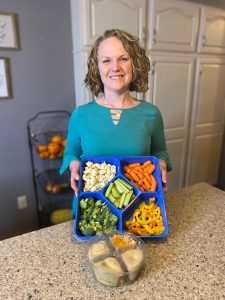Your Non-Diet New Year’s Resolution
December 13, 2021
January 4, 2021by Erin Gonzalez, MS, RD, LD It’s natural to start thinking about ways to make changes for the New Year ahead. How many years have you vowed to cut out all the sugar, exercise every day, and lose weight once and for all? Maybe you have had the experience of starting a new diet … Continued
Erin Gonzalez MS, RD, LD
January 4, 2021
by Erin Gonzalez, MS, RD, LD

Erin Gonzalez is a registered and licensed dietitian at Mankato Clinic. She enourages inituitve eating to find balance, nourishment and enjoyment from food.
It’s natural to start thinking about ways to make changes for the New Year ahead. How many years have you vowed to cut out all the sugar, exercise every day, and lose weight once and for all?
Maybe you have had the experience of starting a new diet plan that promises “lifestyle change” only to feel restricted and deprived leading you to feel out of control around food. Instead of blaming your lack of will power, or self-control, it is important to know that dieting itself is the culprit and that you have never failed, instead you have only been failed. It’s diets and dieting mentality that is causing you to “fail.”
Which is why I want you to make 2021 the year you vow to NOT go on a diet.
Here are 10 of my top New Year’s resolution Ideas:
1. Ditch the scale as a measurement of success and instead focus on positive well-being.
Health is not defined by a number or a body size. Instead of focusing on a number, seek ways to increase energy, improve flexibility, strength, or mobility, improve mood, lower blood glucose or cholesterol levels, etc.
2. Learn how to differentiate between physical hunger and overeating triggers.
Physical hunger will always be accompanied by a physical cue: emptiness of the stomach, gnawing sensation, headache, loss of focus/concentration, irritability, etc. Overeating triggers on the other hand are typically felt from the neck up and are specific to a certain food and you cannot prolong them.
3. Get rid of the “should” and “shouldn’t” from your vocabulary.
Instead, give yourself unconditional permission to eat. Deprivation can lead to uncontrollable cravings and often binging. Making peace with food involves eating foods you enjoy while staying connected to your hunger and fullness levels.
4. Stop labeling food as “good” or “bad.”
End the war with food. No one food, meal, or day of eating will change anything about your body.
5. Ditch the clean plate club and focus on tuning in to fullness cues.
Listen for the body signals that tell you that you are no longer hungry. You are the expert of your own body. No point system, program, or calorie count will ever be as accurate as your own internal cues.
6. Seek satisfaction and enjoyment with food.
Food should be enjoyed! When you eat what you really want you are more likely to feel satisfied and content.
7. Practice daily self-care.
Food is just one of many ways to feel better. When we regularly practice self-care we are more likely to meet our unmet physical, emotional and mental needs which can significantly reduce emotional eating triggers. Try journaling for 5 minutes at night before choosing to eat when struggling with food cravings.
8. Make changes because you love yourself rather than in order to love yourself.
Stop bashing your body and instead focus on showing your body gratitude for all it does for you. Get rid of clothes that no longer fit and buy clothes for your here and now body. You deserve it!
9. Seek ways to move your body that you look forward to.
Shift your focus to how it feels to move your body, rather than the calorie-burning effect of exercise. When you shift your focus to how your body feels when you are active it can make all the difference between getting up for a morning walk or hitting that snooze button.
10. Choose foods that taste and feel good in your body.
Your body naturally seeks balance with all foods, when you stop to ask and listen.
Erin Gonzalez, MS, RD, LD, is a non-diet, Intuitive Eating dietitian who helps people learn how to have a healthy relationship with food and their body so they can eat in a way that honors enjoyment and nourishment with food.
Erin leads the Mankato Clinic Nutrition Education Center. She offers nutrition education for chronic health conditions, nutrition and lifestyle change coaching, and counseling for disordered eating.